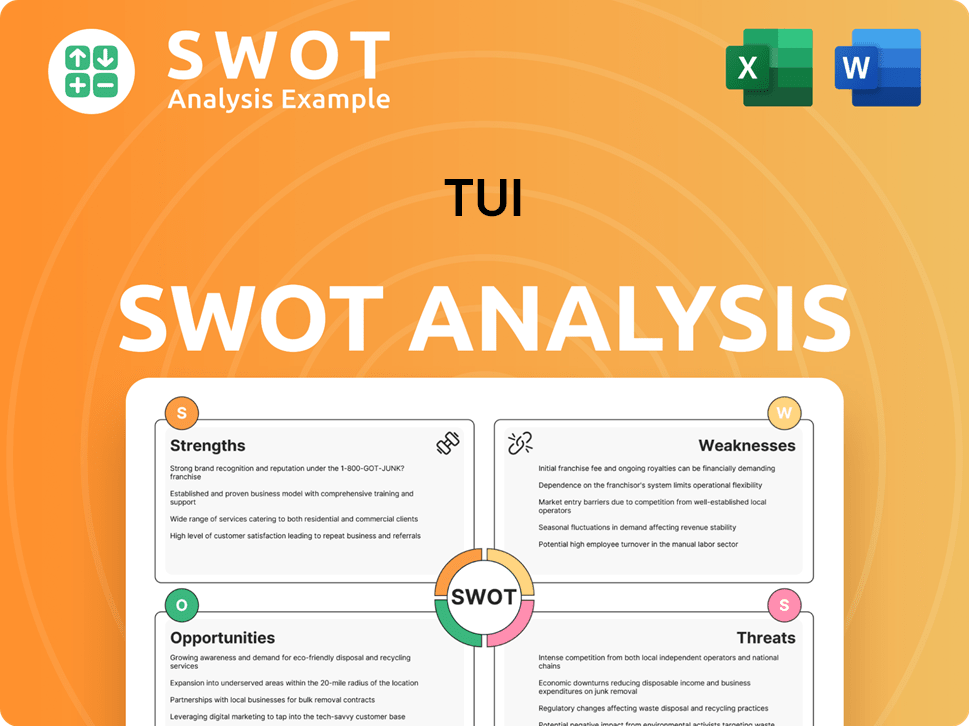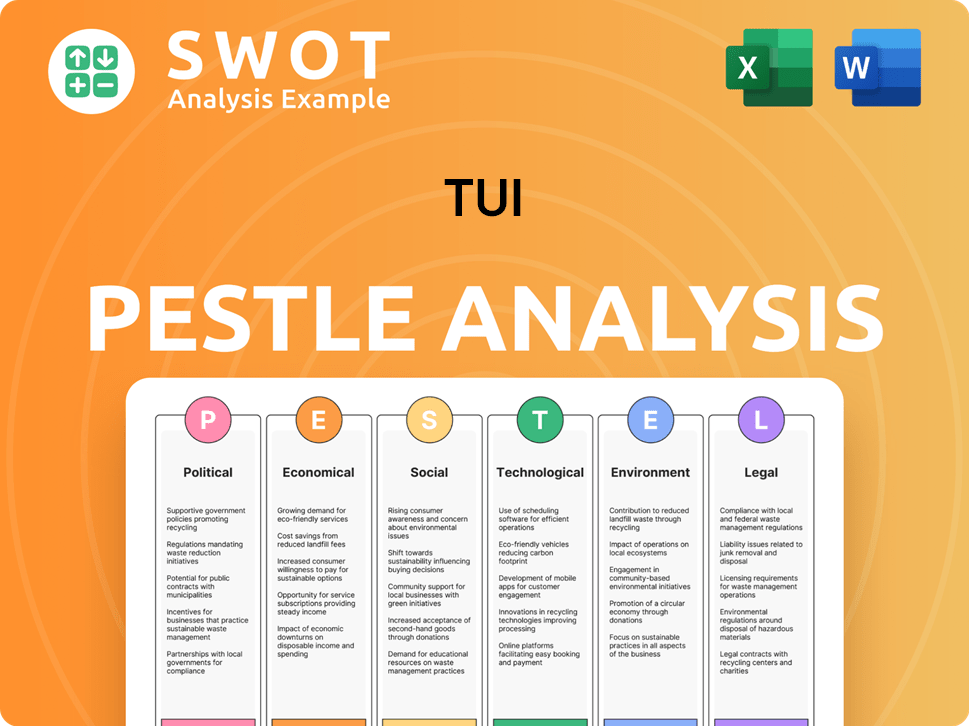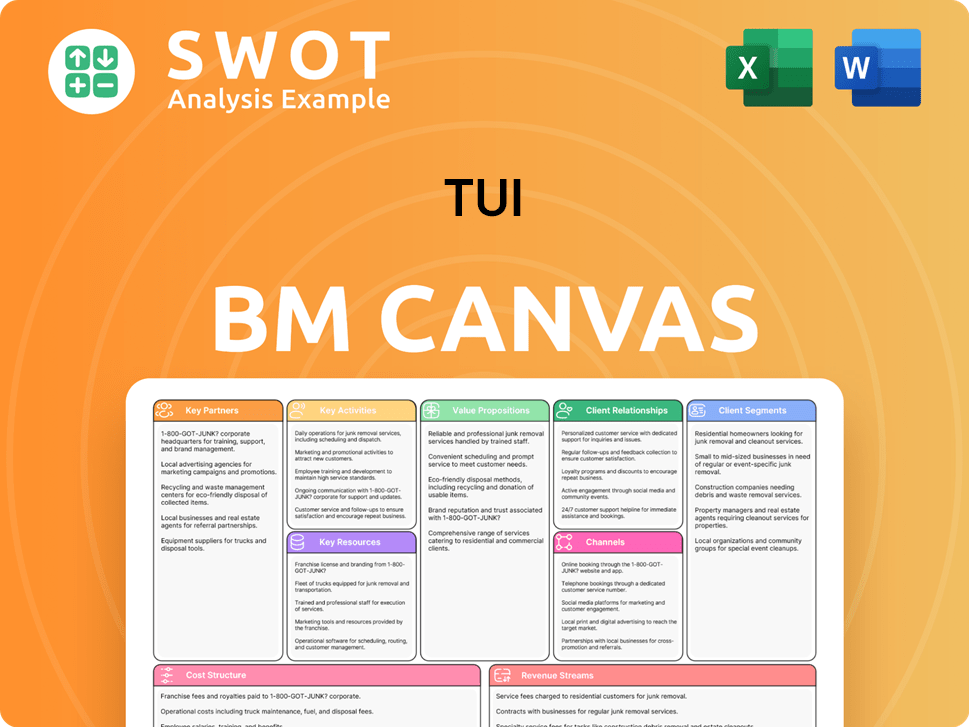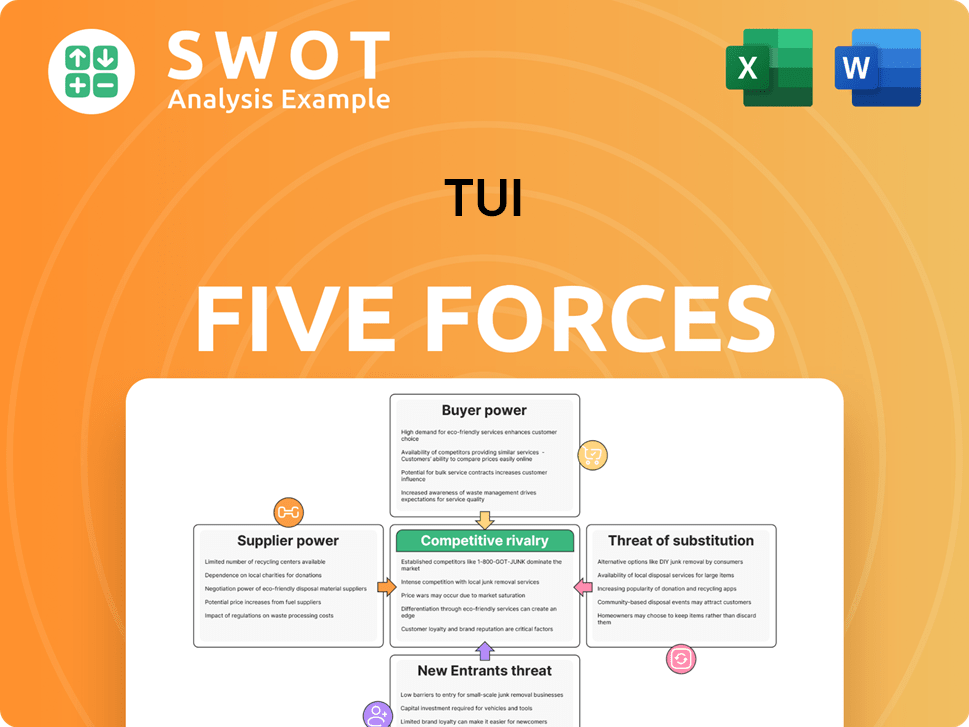TUI Bundle
Who Does TUI Serve in the Ever-Changing Travel Landscape?
In the vibrant travel industry, understanding customer demographics and identifying the right target market is crucial for success. The recent surge in packaged holidays, influenced by rising costs, underscores the need for businesses to adapt. TUI Group, a leading multinational travel and tourism company, has expertly navigated these shifts, focusing on value-driven travel solutions.

This TUI SWOT Analysis is critical for understanding how TUI has evolved from its origins in mining and steel to become a global tourism leader. The shift highlights TUI's commitment to market segmentation and adapting to changing consumer behaviors. This analysis delves into TUI's customer profile, exploring its core customer demographics and how the company tailors its offerings to various segments within its target market. Understanding TUI's customer age range, geographic location, and income levels provides valuable insights into its strategic approach.
Who Are TUI’s Main Customers?
Understanding the customer demographics and target market is crucial for any company's success, and TUI Group is no exception. As a major player in the travel industry, TUI focuses on the Business-to-Consumer (B2C) segment, directly serving individual travelers. Analyzing the TUI company analysis reveals a diverse customer base, with marketing efforts tailored to specific groups.
In the financial year 2024 (October 2023 to September 2024), TUI served over 20.3 million customers worldwide, marking a 7% increase from the previous year. This growth underscores the importance of understanding and catering to various customer segments. While specific demographic details like age, gender, or income levels aren't publicly available for 2024-2025, TUI's approach to 'tailor-made package holidays' and 'personalized travel experiences' highlights its awareness of diverse customer needs.
The company's strategic goals include expanding its customer base and broadening its appeal. This indicates an ongoing effort to reach beyond its traditional core demographic. The 'Holiday Experiences' segment, encompassing Hotels & Resorts, Cruises, and TUI Musement, has shown strong growth, contributing significantly to underlying EBIT, suggesting a substantial and growing segment for integrated holiday experiences.
TUI's primary customer segments include families, luxury travelers, and adventure seekers. The company tailors its marketing to attract these diverse groups. The focus on personalized travel experiences suggests an understanding of varied customer preferences.
TUI segments its market to offer tailored packages and experiences. The resurgence of packaged holidays, with an 18% surge in late 2024, demonstrates the effectiveness of this approach. Dynamically packaged holidays accommodated up to 0.7 million holidaymakers.
TUI is expanding its geographic reach beyond Europe. This strategic move aims to diversify its target segments and cater to emerging traveler profiles in new markets. This expansion is part of a broader strategy to increase customer volumes.
Rising travel costs have boosted the demand for packaged holidays. This trend reinforces the value proposition of TUI's offerings. The company's ability to adapt to changing economic conditions is crucial for its success.
TUI's customer base includes various segments, each with unique needs and preferences. The company's marketing strategies are designed to resonate with these diverse groups, ensuring a wide reach. Understanding the customer profile is essential for effective marketing.
- Families: Offering family-friendly packages and activities.
- Luxury Travelers: Providing premium travel experiences and services.
- Adventure Seekers: Catering to those looking for unique and exciting trips.
- Customers Seeking Integrated Holiday Experiences: This includes accommodation, flights, and activities.
TUI SWOT Analysis
- Complete SWOT Breakdown
- Fully Customizable
- Editable in Excel & Word
- Professional Formatting
- Investor-Ready Format

What Do TUI’s Customers Want?
Understanding customer needs and preferences is crucial for the success of any travel company. For TUI, this involves a deep dive into the motivations, behaviors, and desires of its diverse customer base. This analysis helps tailor offerings, marketing strategies, and customer experiences to meet and exceed expectations.
The travel industry is constantly evolving, and TUI must adapt to changing customer demographics and preferences. This includes offering value, convenience, and memorable experiences. By understanding these dynamics, TUI can maintain its competitive edge and foster customer loyalty.
The company's success hinges on its ability to provide what customers want, whether it's a budget-friendly package or a luxurious, sustainable getaway. This customer-centric approach allows TUI to build strong relationships and drive business growth.
Customers are increasingly drawn to the financial predictability and ease of planning offered by packaged holidays. TUI's integrated packages bundle flights, accommodations, and other services at a fixed price. This directly addresses the need for budget management and streamlined booking.
Purchasing behaviors indicate a preference for all-encompassing travel deals. A significant portion of summer bookings in 2024 were made well in advance. The demand for dynamically packaged holidays, which saw an 18% surge in late 2024, highlights the customer desire for flexibility.
TUI notes strong demand for short and medium-haul destinations. The Canary Islands, Egypt, and Cape Verde were particularly popular in Winter 2024/25. For Summer 2025, Spain, Greece, and Turkey are the most popular destinations.
Customers seek 'meaningful and emotionally resonant moments' and 'lasting memories' from their holidays. TUI emphasizes 'exclusive, high-quality experiences' and curates tours and premium all-inclusive packages. This focus fosters stronger customer loyalty.
Sustainability is a crucial driver influencing customer preferences. TUI invests in eco-friendly resorts and promotes sustainable travel practices. TUI aims to enable 20 million customers to choose sustainable holidays annually by 2030.
TUI tailors its marketing for specific demographics like families, luxury travelers, and adventure seekers. Digital transformation enables personalized travel recommendations and streamlined booking. Data-driven insights further refine marketing and service offerings.
TUI's approach to understanding its customers involves a multifaceted strategy, focusing on data-driven insights and tailored experiences. This includes analyzing booking patterns, destination preferences, and feedback to refine its offerings and marketing efforts. For more detailed insights, you can explore the Growth Strategy of TUI.
- Customer Demographics and TUI Target Market: The company segments its market based on factors such as age, income, family status, and travel preferences. This allows TUI to create targeted campaigns and product offerings.
- Market Segmentation: TUI uses market segmentation to tailor its products and services. This includes families, couples, solo travelers, and adventure seekers. Each segment receives customized marketing messages and travel options.
- Customer Buying Behavior: TUI analyzes customer buying behavior to understand how customers make travel decisions. This includes the timing of bookings, the types of packages chosen, and the preferred destinations.
- Customer Loyalty Programs: TUI offers loyalty programs to reward repeat customers and encourage brand loyalty. These programs provide exclusive benefits and personalized offers.
- Customer Service Expectations: TUI focuses on providing excellent customer service, including 24/7 support and easy-to-use booking platforms. This enhances customer satisfaction and encourages repeat business.
TUI PESTLE Analysis
- Covers All 6 PESTLE Categories
- No Research Needed – Save Hours of Work
- Built by Experts, Trusted by Consultants
- Instant Download, Ready to Use
- 100% Editable, Fully Customizable

Where does TUI operate?
The geographical market presence of the [Company Name] is predominantly centered in Europe, with a strategic expansion into global markets. This expansion is part of a broader strategy to diversify its revenue streams and reduce dependency on any single region. The company's approach involves customizing offerings and marketing strategies to suit the specific needs and preferences of diverse customer segments across various geographic locations.
The company segments its main markets into three key regions: Northern, Central, and Western. Each region is characterized by distinct customer demographics and preferences, influencing the types of travel packages and services offered. This segmentation allows the company to tailor its products more effectively, enhancing customer satisfaction and driving sales within each specific market.
The company's strategic expansion includes a focus on new growth markets beyond Europe. This includes Southeast Europe, Asia, and Latin America, demonstrating a proactive approach to tap into emerging travel trends and opportunities. The company's ability to adapt to changing customer demographics and preferences is crucial for maintaining its competitive edge in the dynamic travel industry.
The Northern region, encompassing the United Kingdom, Ireland, and the Nordic countries, was the most profitable segment in 2024. This region generated approximately 8.5 billion euros in revenue between October 2023 and September 2024. This demonstrates the strong market share and brand recognition the company holds within these key European markets.
The Central region, including Germany, Austria, Poland, and Switzerland, accounted for the largest number of customers in 2024. This highlights the importance of this region in terms of overall customer volume. Understanding the customer demographics in this region is crucial for tailoring travel products.
The Western region, comprising Belgium, the Netherlands, and France, also plays a significant role in the company's European market strategy. Although specific revenue figures for this region are not provided, it is a key component of the company's overall market segmentation. The company focuses on understanding the travel preferences of this customer base.
The company is actively expanding beyond its traditional European focus, targeting new growth markets in Southeast Europe, Asia, and Latin America. This strategic move aims to reduce its dependence on European markets. This expansion is crucial for long-term growth and resilience in the travel industry.
The company employs several strategies to succeed in diverse markets, including customizing offerings and marketing. For the Winter 2024/25 season, popular destinations include the Canary Islands, Egypt, and Cape Verde. For Summer 2025, Spain, Greece, and Turkey are highly popular destinations. The company also increases its reach via B2B partnerships.
- The company is launching new-build ships for its cruise lines, such as Mein Schiff 7 in 2024.
- Further launches are planned for the next two years.
- These investments in specific product lines serve growing demand in various regions.
- The company's focus on international destinations and B2B partnerships shows its commitment to growth.
TUI Business Model Canvas
- Complete 9-Block Business Model Canvas
- Effortlessly Communicate Your Business Strategy
- Investor-Ready BMC Format
- 100% Editable and Customizable
- Clear and Structured Layout

How Does TUI Win & Keep Customers?
The core of [Company Name]'s strategy revolves around effective customer acquisition and retention, essential for thriving in the competitive travel industry. This approach combines traditional and digital marketing, strategic alliances, and a strong emphasis on customer satisfaction to capture and maintain its customer base. Understanding the customer demographics is critical for tailoring services and marketing efforts to specific segments, ensuring relevance and driving engagement.
A key element of [Company Name]'s customer acquisition strategy is its integrated tourism model, offering a comprehensive range of travel services. By providing a one-stop-shop for flights, accommodations, cruises, and guided tours, [Company Name] simplifies the travel planning process. This integrated approach appeals to a broad TUI target market, making travel more accessible and convenient for a wide range of customers.
The company's marketing strategies are highly targeted, focusing on different segments such as families, luxury travelers, and adventure seekers. This approach ensures that marketing messages and offers resonate directly with each audience. Digital transformation plays a crucial role, with tailored travel recommendations, streamlined booking processes, and real-time support. The company is also enhancing its app with a focus on 'native bookflows' to drive further growth in digital sales made in-app.
The 'one-stop-shop' simplifies travel planning, appealing to a wide market. The resurgence of packaged holidays has been a significant driver for acquisition, with [Company Name] capitalizing on the demand for all-inclusive and dynamically packaged deals. In late 2024, dynamically packaged holidays saw an 18% surge.
Marketing efforts are tailored to specific customer demographics. Digital transformation provides tailored travel recommendations and streamlined booking processes. The company is also enhancing its app with a focus on 'native bookflows' to drive further growth in digital sales made in-app.
Emphasis on creating memorable experiences fosters stronger customer loyalty. Actively monitors customer feedback and provides 24/7 support globally. The company utilizes a single customer database to enable cross-selling and upselling.
Sustainability initiatives attract environmentally conscious travelers and enhance brand reputation. 12.1 million guests stayed at a certified sustainable hotel in fiscal year 2024. This focus aligns with the growing demand for eco-friendly travel options.
The acceleration of the Markets + Airline transformation in September 2024 aims to deliver growth targets through a new operating model. This transformation seeks to increase dynamic packaging and diversify offerings. The goal is to improve customer loyalty and reduce churn.
The company segments its market to provide personalized offers to families, luxury travelers, and adventure seekers. This approach ensures that each segment receives tailored offers. Understanding TUI's customer profile allows for more effective marketing.
Digital channels play a crucial role in customer acquisition. Tailored travel recommendations and streamlined booking processes are key. The enhanced app with 'native bookflows' drives digital sales growth. This is a key aspect of TUI company analysis.
Providing 24/7 global support is a key retention strategy. [Company Name] actively monitors customer feedback to improve satisfaction. This commitment to service enhances customer loyalty and builds trust.
For a deeper understanding of the company's financial structure, explore the Revenue Streams & Business Model of TUI. This provides insight into how [Company Name] generates income and its overall business strategy.
TUI Porter's Five Forces Analysis
- Covers All 5 Competitive Forces in Detail
- Structured for Consultants, Students, and Founders
- 100% Editable in Microsoft Word & Excel
- Instant Digital Download – Use Immediately
- Compatible with Mac & PC – Fully Unlocked

Related Blogs
Disclaimer
All information, articles, and product details provided on this website are for general informational and educational purposes only. We do not claim any ownership over, nor do we intend to infringe upon, any trademarks, copyrights, logos, brand names, or other intellectual property mentioned or depicted on this site. Such intellectual property remains the property of its respective owners, and any references here are made solely for identification or informational purposes, without implying any affiliation, endorsement, or partnership.
We make no representations or warranties, express or implied, regarding the accuracy, completeness, or suitability of any content or products presented. Nothing on this website should be construed as legal, tax, investment, financial, medical, or other professional advice. In addition, no part of this site—including articles or product references—constitutes a solicitation, recommendation, endorsement, advertisement, or offer to buy or sell any securities, franchises, or other financial instruments, particularly in jurisdictions where such activity would be unlawful.
All content is of a general nature and may not address the specific circumstances of any individual or entity. It is not a substitute for professional advice or services. Any actions you take based on the information provided here are strictly at your own risk. You accept full responsibility for any decisions or outcomes arising from your use of this website and agree to release us from any liability in connection with your use of, or reliance upon, the content or products found herein.